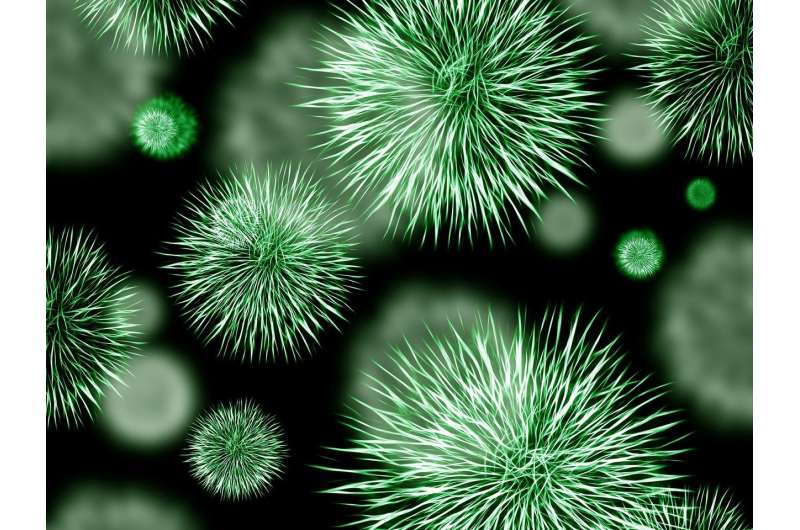Bacteria can survive starvation in zombie mode

Bacteria that are exposed to a hostile environment, for example with antibiotics or very few nutrients, can sometimes survive by 'going to sleep." Biologists from the University of Amsterdam (UvA) have discovered an unknown, alternative survival strategy: a kind of zombie mode, in which the bacteria do not sleep, but slow down extremely. Their discovery has been published in the journal Nature Communications.
Bacteria appear to be simple, single-celled organisms. Yet they surprise scientists time and again with all the tricks they are capable of. For example, many bacteria can form so-called endospores under the influence of stress. The dire circumstances drive the bacteria to encapsulate themselves in a special sturdy coat, within which they can safely 'sleep' until more favourable conditions arise. In that dormant state, the bacteria no longer need nutrients and become resistant to damaging influences of, for example, cold, UV light or antibiotics. A good thing for the bacteria, but less beneficial for us: thanks to this trick, bacterial infections can suddenly flare up again after they were seemingly successfully treated with antibiotics.
Starving the bacteria
An international team of biologists, led by Professor Leendert Hamoen of the UvA's Swammerdam Institute for Life Sciences, has now discovered an alternative survival strategy for bacteria that are exposed to extreme conditions. They worked with Bacillus subtilis, a non-pathogenic bacterium that occurs in the soil and which scientists often use as a model organism. The biologists chose a variant of the bacterium that can no longer form endospores due to a mutation. Subsequently, they simply starved the bacteria. Some of the bacteria were found to survive this for a long time, even though they could not retreat to their usual dormant state. Staying active, due to the lack of nutrients, was also not an option. So, how did they survive?
The bacteria were found to take refuge in a third, as yet unknown state. You could call it a kind of zombie state. The zombie bacteria are not really active, nor do they sleep; all types of processes slow down to an extremely low level. "We saw clear differences between the active state, the dormant state and this state," says Hamoen. "Normally, Bacillus is rod-shaped; but the starved bacteria shrank until they were almost spherical. All kinds of processes that are normally active in the bacterium were altered. But they did not stop completely, as happens when the bacterium retreats to a spore in a dormant state. The bacteria even continued to divide. Only not once every forty minutes, but once every four days; more than a hundred times slower than usual."
New light on antibiotics
The researchers themselves, of course, do not call this state a zombie mode. They have named the previously unknown survival strategy oligotrophic growth. This term translates into 'nutrient-poor growth."
Hamoen says, "The big question now is: do bacteria other than Bacillus know this trick too? If so, this fundamentally changes our outlook on bacteria. Apparently, they do not always have to form spores to survive. Forming endospores requires a lot of energy, and the bacteria are not always able to 'wake up' from this condition. It is much easier for them to switch to and from this oligotrophic growth state. Once conditions improve, they can easily form new colonies. Hence this state is much more favourable for them. If more bacteria are found to be able to switch to this state, it will throw a whole new light on, among other things, how bacteria can escape antibiotics. '
More information: Declan A. Gray et al. Extreme slow growth as alternative strategy to survive deep starvation in bacteria, Nature Communications (2019). DOI: 10.1038/s41467-019-08719-8
Journal information: Nature Communications
Provided by University of Amsterdam




















